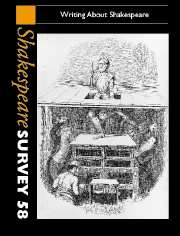Book contents
- Frontmatter
- Having Our Will: Imagination in Recent Shakespeare Biographies
- Toward a New Biography of Shakespeare
- Jonson, Shakespeare and the Exorcists
- ‘Lending soft audience to my sweet design’: Shifting Roles and Shifting Readings of Shakespeare’s ‘A Lover’s Complaint’
- ‘Armed at point exactly’: The Ghost in Hamlet
- Writing About Motive: Isabella, the Duke and Moral Authority
- Writing Performance: How to Elegize Elizabethan Actors
- Elizabeth Montagu: ‘Shakespear’s poor little Critick’?
- Rewriting Lear’s Untender Daughter: Fanny Price as a Regency Cordelia in Jane Austen’s Mansfield Park
- The Prequel as Palinode: Mary Cowden Clarke’s Girlhood of Shakespeare’s Heroines
- Shakespeare Among the Workers
- Virginia Woolf Reads Shakespeare: Or, her Silence on Master William
- Shakespeare and the Invention of the Epic Theatre: Working with Brecht
- Dramatizing the Dramatist
- Shakespeare in Drama Since 1990: Vanishing Act
- Writing about [Shakespearian] performance
- Shakespeare and the Prospect of Presentism
- Writing Shakespeare in the Global Economy
- The ‘Complexion’ of Twelfth Night
- Translation as Appropriation: Vassilis Rotas, Shakespeare and Modern Greek
- How Old Were Shakespeare’s Boy Actors?
- Mistress Tale Porter and the Triumph of Time: Slander and Old Wives’ Tales in The Winter’s Tale
- Shakespeare Performances in Ireland, 2002–2004
- Shakespeare Performances in England, 2004
- Professional Shakespeare Productions in the British Isles January–December 2003
- The Year's Contributions to Shakespearian Study 1 Critical Studies
- 2 Shakespeare in Performance
- 3 Editions and Textual Studies
- Books Received
- Index
Shakespeare Performances in England, 2004
Published online by Cambridge University Press: 28 March 2007
- Frontmatter
- Having Our Will: Imagination in Recent Shakespeare Biographies
- Toward a New Biography of Shakespeare
- Jonson, Shakespeare and the Exorcists
- ‘Lending soft audience to my sweet design’: Shifting Roles and Shifting Readings of Shakespeare’s ‘A Lover’s Complaint’
- ‘Armed at point exactly’: The Ghost in Hamlet
- Writing About Motive: Isabella, the Duke and Moral Authority
- Writing Performance: How to Elegize Elizabethan Actors
- Elizabeth Montagu: ‘Shakespear’s poor little Critick’?
- Rewriting Lear’s Untender Daughter: Fanny Price as a Regency Cordelia in Jane Austen’s Mansfield Park
- The Prequel as Palinode: Mary Cowden Clarke’s Girlhood of Shakespeare’s Heroines
- Shakespeare Among the Workers
- Virginia Woolf Reads Shakespeare: Or, her Silence on Master William
- Shakespeare and the Invention of the Epic Theatre: Working with Brecht
- Dramatizing the Dramatist
- Shakespeare in Drama Since 1990: Vanishing Act
- Writing about [Shakespearian] performance
- Shakespeare and the Prospect of Presentism
- Writing Shakespeare in the Global Economy
- The ‘Complexion’ of Twelfth Night
- Translation as Appropriation: Vassilis Rotas, Shakespeare and Modern Greek
- How Old Were Shakespeare’s Boy Actors?
- Mistress Tale Porter and the Triumph of Time: Slander and Old Wives’ Tales in The Winter’s Tale
- Shakespeare Performances in Ireland, 2002–2004
- Shakespeare Performances in England, 2004
- Professional Shakespeare Productions in the British Isles January–December 2003
- The Year's Contributions to Shakespearian Study 1 Critical Studies
- 2 Shakespeare in Performance
- 3 Editions and Textual Studies
- Books Received
- Index
Summary
2004 was another year for grief, horror and distress in the English Shakespearian theatre in general, and in Stratford-upon-Avon in particular, but for once I can report that this was for all the right reasons. With Michael Boyd firmly established as the RSC’s new artistic director, the company’s ample helpings of doom and gloom were in 2004 mainly confined to its stages instead of permeating the entire organization, taking the form of an ambitious all-tragedy repertory season in a Royal Shakespeare Theatre reprieved from the threat of demolition and instead scheduled for a long-overdue internal remodelling of the auditorium. The spring and summer’s Macbeth, Romeo and Juliet, King Lear and Hamlet, all of which transferred in turns to the Albery theatre in London during the winter 2004–5 season, were prefaced by a fine stand-alone Othello in the Swan (which itself transferred to a new venue, the Trafalgar Studios on Whitehall, in the early summer), and elsewhere too the tragedies were in special favour. Cheek by Jowl offered the year’s other striking Othello (which spent most of the year touring the world, to close at the Riverside Studios in Hammersmith in December); the Globe presented their own Romeo and Juliet, and Vesturport’s high-wire Icelandic Romeo and Juliet (described in the previous Survey) made a welcome return to London, this time to the Playhouse on Northumberland Avenue (and this time with special guest celebrity cameos). Meanwhile Hamlet, the play Michael Boyd had chosen for his first RSC production as artistic director, found itself receiving rival attentions from two longer-established heavyweights among directors: one of Boyd’s forbears as head of the RSC, Trevor Nunn, perhaps mischievously, opened a Hamlet of his own at the Old Vic just a few weeks in advance of Boyd’s Stratford press night, and later Yukio Ninagawa brought what was essentially a revival of his 1998 account of the play to the RSC’s former auditorium at the Barbican, just between Boyd’s production’s Stratford run in the summer and its London transfer in the late autumn.
- Type
- Chapter
- Information
- Shakespeare Survey , pp. 268 - 297Publisher: Cambridge University PressPrint publication year: 2005



